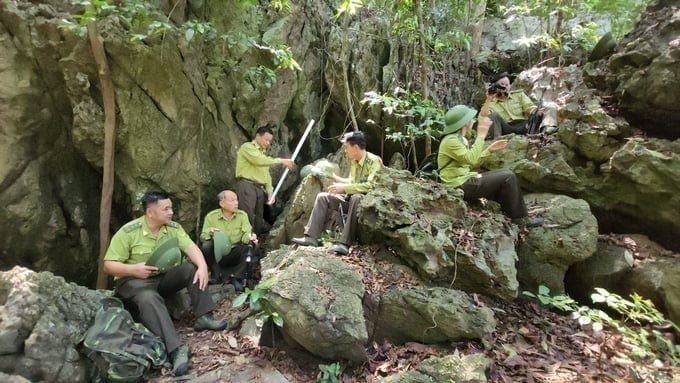November 26, 2025 | 16:33 GMT +7
November 26, 2025 | 16:33 GMT +7
Hotline: 0913.378.918
November 26, 2025 | 16:33 GMT +7
Hotline: 0913.378.918

The Party and State pay special attention to the issue of sustainable forestry development.
The Resolution aims to create a vigorous change in awareness of the forest’s role and importance. Thereby changing behaviors and habits in daily life, production, and consumption; creating motivation for the work of sustainable forest management, protection, and development; and promoting socialization of forest management, protection, and development.
At the same time, the Resolution also aims to develop a sustainable forest economy in a multi-purpose, multi-value direction based on effectively managing and using forest and land resources planned for forestry purposes. Diversify types of organizations, cooperation, linakage, and benefit sharing in forestry production and business towards green, sustainable, and circular production. Mobilize legal resources for the development of a sustainable forest economy.
To effectively deploy Conclusion No. 61-KL/TW dated August 17, 2023 of the Secretariat on continuing to implement Directive No. 13-CT/TW dated January 12, 2017, the Government proposed seven key solutions as following:
First, innovate, diversify, and improve the effectiveness of the work of disseminating, mobilizing, educating, and raising awareness and responsibility for sustainable forest management, protection, and development. Second, perfect laws, mechanisms, and policies on forestry. Third, develop the forest economy. Fourth, organize the effective implementation of national forestry planning and a number of key projects.
Fifth, continue to arrange the organization and apparatus and improve the capacity and efficiency of state management in forestry. Sixth, innovate, develop, and improve the operational efficiency of agricultural and forestry companies. Seventh, promote research and application of science, technology, and digital transformation, and proactively improve the effectiveness of international integration in forestry.
Resolution No. 29 also emphasizes the issue of thoroughly handling land disputes originating from afforestation yards. In particular, the action program will focus on developing and replicating a number of combined agro-forestry-fishery economic models. This aims to both meet the requirements of forest protection and conservation of natural biodiversity and forest ecosystems and promote the resource potential and value of special-use forests. The program also pays attention to developing models for forest protection and conservation of mangrove ecosystems associated with aquaculture.
Along with that, resolve and remove obstacles and difficulties in arranging and innovating agricultural and forestry companies in localities, especially in the handover and reception of forestry companies from ministries and branches to the People's Committees of provinces and municipalities.
Thoroughly handle backlogs and land disputes originating from afforestation yards and forestry companies; put an end to the situation where forestry companies and businesses are allocated land but do not use it (ceded, leased, lent, or contracted) or use it ineffectively. Completely handle overlapping, disputed, and encroached forestry land areas.
The Ministry of Agriculture and Rural Development is assigned as the standing agency, assisting the Government in urging, organizing, guiding, and inspecting the implementation of this Resolution. Handling or reporting to competent authorities to handle problems that arise during the implementation of the Resolution. Reporting annually or irregularly (when required) to the Government on the implementation of this Resolution.
Ministries, ministerial-level agencies, government agencies, and People's Committees of provinces and municipalities review and organize the implementation of assigned tasks in the Government’s Resolution No. 71/NQ-CP dated August 8, 2017, issuing the Action Program to implement Directive No. 13-CT/TW and assigned main tasks.
Translated by Huyen Vu Thu

(VAN) After the institutional merger, Da Nang possesses significant forest-carbon reserves and is proactively engaging in the carbon market, creating a new revenue stream.

(VAN) An Giang strengthens communication against IUU fishing, increases inspections and sanctions, and is determined to remove the EC’s “yellow card” while developing a sustainable fisheries sector.

(VAN) As green transition becomes a global trajectory, Viet Nam’s biggest challenge is not only technology and models, but how to ensure that capital flows reach the right beneficiaries.

(VAN) The Ministry of Agriculture and Environment must spearhead the construction of green governance, spanning decision-making processes and investment standards to policy evaluation mechanisms.

(VAN) The Agriculture and Environment sector of Khanh Hoa has achieved numerous milestones over the past 80 years, contributing significantly to the goal of establishing the province as a centrally governed city by 2030.

(VAN) Viet Nam is entering the pivotal period of 2025-2030, moving toward the formulation of the Remote Sensing Law, which will establish a legal foundation for the development of national digital data.

(VAN) The agricultural sector is finalizing the strategic framework for emission reduction, setting the goal of sharply cutting methane and 403.7 million tons of CO2 equivalent and moving toward Net Zero by 2050.